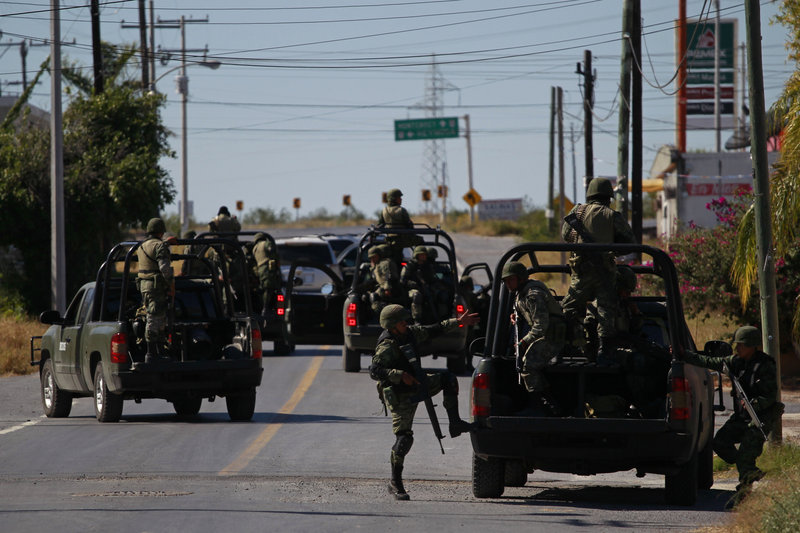MEXICO CITY – Over a 48-hour period this week, drug gangs tossed grenades, torched buses, set up roadblocks and strafed police units in Mexico’s second and third largest cities.
Assailants in Guadalajara and Monterrey used a variety of tactics. In several assaults, they acted like hit-and-run guerrillas. In other skirmishes, they mimicked small army units. Elsewhere, they hijacked vehicles like common criminals.
As gangsters demonstrate an ample repertoire of fighting skills, it is little wonder that four years into President Felipe Calderon’s battle against organized crime, many Mexicans aren’t sure what to call the turmoil in their country. Is Mexico at war? Does it face a criminal insurgency? Or is it locked in sustained gangland violence?
Calderon himself shies away from uttering the “w” word — war.
Calderon said that he preferred to use the phrase the “struggle against organized crime … and I will continue using it.”
The linguistic debate came further to the fore when a German think tank, the Heidelberg Institute for International Conflict Research, issued its 19th annual rankings of worldwide conflict last month, elevating the status of the conflict in Mexico from “crisis” to “war,” putting it alongside Afghanistan, Sudan, Iraq and Somalia.
“Clashes, especially between security forces and drug gang members, rose dramatically in comparison to past years, adding up to several hundred incidents all over the country,” the institute said, explaining that it believed Mexico’s conflict had “escalated to a full scale war.”
According to a database offered by the government, last year’s 15,273 violent deaths marked the bloodiest year since the president launched a head-on confrontation with the cartels in late 2006. Since then, the death toll stands at 34,612 deaths.
Like Calderon, some Mexican analysts shy away from saying that the nation is at war with organized crime groups.
“It is a generalized combat against powerful criminals. It’s not exactly a war, because that would imply there are two armies,” said Jorge Chabat, an expert on security issues at the Center for Research and Teaching on Economics.
Employing the word “war” may summon a sense of patriotic urgency among Mexicans, Chabat said, but it also creates expectations.
“With a war, you either win or lose. And with this one, how are we going to win it?” he asked.
Calderon called the White House in September to protest after Secretary of State Hillary Rodham Clinton suggested that some drug gangs in Mexico were “morphing into, or making common cause with, what we would consider an insurgency.”
On a visit to Mexico last week, Clinton watched her words carefully, declaring that Calderon’s intention to smash the cartels is “absolutely necessary. If it were easy, it would have been done before. It is not easy. … But there is no alternative.”
U.S.-based analysts of Mexico’s violence aren’t so reluctant to use “war” to describe the ambushes of convoys, attacks on military and police outposts, and use of grenades and high-caliber weaponry that now characterize the conflict in parts of Mexico, particularly in the states of Tamaulipas, Nuevo Leon, Chihuahua, Sonora, Guerrero and Michoacan.
“Drug trafficking organizations in Mexico have gone way beyond organized crime, and should be considered as hybrids between a mafia, insurgency, and terrorist group based solely on the tactics they’re using,” said Sylvia Longmire, an analyst and frequent writer on Mexico’s internal conflict.
Since the beginning of the year, outlaws have thrown grenades at a prison, at police facilities and at police roadblocks within the city limits of Monterrey, the industrial capital in the northeast. In one attack Monday, a grenade blast hurt five, including a university professor and a police officer.
Send questions/comments to the editors.



Success. Please wait for the page to reload. If the page does not reload within 5 seconds, please refresh the page.
Enter your email and password to access comments.
Hi, to comment on stories you must . This profile is in addition to your subscription and website login.
Already have a commenting profile? .
Invalid username/password.
Please check your email to confirm and complete your registration.
Only subscribers are eligible to post comments. Please subscribe or login first for digital access. Here’s why.
Use the form below to reset your password. When you've submitted your account email, we will send an email with a reset code.